15th Annual IT Salary Survey: Good Times Ahead?
In the 15th year of Redmond magazine's annual salary survey, IT salaries generally remained flat, but some respondents got raises -- giving rise to general optimism about salaries next year.
| More Salary Survey |
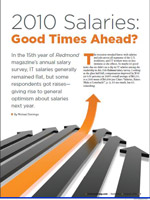 The PDF format of this article boasts many more charts, including average salaries by state and region, information on outsourcing and more. Free registration is required to get the PDF. Get it here. The PDF format of this article boasts many more charts, including average salaries by state and region, information on outsourcing and more. Free registration is required to get the PDF. Get it here.
|
The recession wreaked havoc with salaries and jobs across all segments of the U.S. workforce, and IT workers were no less immune to the effects. So maybe it's good news that we didn't see a dip in IT salaries among the readership in this 15th
Redmond salary survey. Looking at the glass half full, compensation improved by $536 (or 0.63 percent) on 2009's overall average of $83,113, to a 2010 mean of $83,638 (see Chart 1. It's not much, but it's something.
"It doesn't surprise me that salaries went up, even though minimally," says Russell Young, a network administrator with a government health care company in Montana. "With the government's big push -- especially in the health-care arena -- to utilize IT more effectively, the skill sets are more in demand than ever."
Michael Hensley, a systems administrator with a Redmond, Ore., nonprofit agency, agrees with Redmond reader James A., who notes: "Salaries probably increased because companies are hiring less and trying to get more out of existing employees. Higher salaries improve retention and help keep more productive employees." [To preserve the anonymity of some respondents we cite throughout this article, we refer to them by first name and last initial only. -- Ed.]
James A. and Hensley aren't alone in their opinions. There's a similar refrain from many respondents we followed up with in the weeks after the survey. We're seeing corroboration of their observations not just in our own survey, but in recently published, external sources that show salaries in IT have been trending upward, while jobs remain scarce.
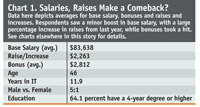
[Click on image for larger view.] |
An IT salary study just released in June by Janco Associates Inc. shows salaries ticking up slightly but remaining mostly flat: IT executives at large enterprises had a 0.97 percent increase, while those at midsize companies edged lower by 0.75 percent, for a combined 0.21 percent uptick. The Janco study also projects hiring will be weak in the next year.
Data from the U.S. Bureau of Labor also shows IT-based jobs being added between 2008 and 2018 at a pace of 28,660 per year. While those results come out weak in comparison to year-over-year data for computer-based jobs, the Bureau of Labor does consider these numbers to be "better than average" against the general workforce.
High on Optimism
2010 doesn't look anything like 2009's banner results, when salaries went up 7.9 percent from the previous year. "I'm running lower than last year at the moment," says Bill O'Reilly, president of Seattle-based TEChange Inc., an IT service provider for small to midsize business (SMBs). "Businesses seem to be in hunker-down mode and, regardless of what the economic indicators say, they're waiting to see what happens this year," O'Reilly explains.
Some respondents were luckier than most, mainly due to some companies offering cost-of-living adjustments, or even more. "My salary went up by 3 percent," says Rob Zelinka, director of IT infrastructure at railcar management company TTX in Chicago. "I was elated, and surprised," Zelinka adds. We heard the same story repeated time and again from readers we followed up with.
Chart 2 breaks down the numbers by range, and it's not as pretty in comparison to last year's numbers. While those earning between $20,000-$40,000 at the low end and anyone making more than $95,000 saw nice increases year-over-year, those in the $40,000-$75,000 range were poorer than in 2009. Those in the $70,000-$74,999 and $85,000-$95,000 range reported making about 15 percent less than last year, as well.
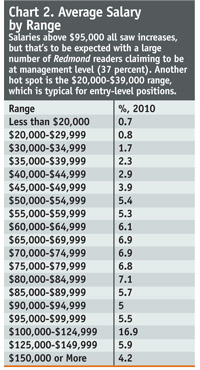
[Click on image for larger view.] |
While it's been a challenging year for compensation, the general feeling among respondents is that they're fairly compensated. This year, we asked respondents to tell us how their salaries measured up to last year. Oddly enough, more than half believe their salaries to be higher, with only 11.7 percent feeling the cut (the rest say their salaries are frozen) -- even though the mean result clearly shows that the gains were balanced out by the negative result of the losses.
More than 56 percent of respondents expect such optimism to translate into higher compensation in the next 12 months. "I think the trend will probably continue. If nothing else, I think you'll see cost-of-living increases," says O'Reilly. "How long it will continue is anybody's guess."
"A shortage of good-quality IT people will create a vacuum and a demand for higher paid salaries," argues Kevin F., an IT manager in Seattle. "Lower-end jobs will be outsourced, but it's very hard to outsource people who truly align your business with IT."
Nearly 40 percent expect no change whatsoever. Then there's the 5 percent who, like Richard R., a management information systems director with a media company in New York, expect "a continuing drag on salaries" due to the job market and various other factors.
Raises Now and Raises Later
With a challenging year in regards to compensation, we didn't expect good news to come from raises. If anything, it was a mixed bag of good and bad news. The bad news on raises first: 40.3 percent of respondents, or 13.5 percent more than a year ago, saw none.
"I was actually expecting a raise this year," says Hensley. "The recession was a factor in not receiving a raise."
Helmut Schonwalder, an IT support technician at Monterey Peninsula College in California, didn't expect a raise at all, for good reason: "The state is still in the middle of a budget crisis, [so] college employees can't expect much in the form of raises."
So, what's the good news? Only 7.4 percent (or about 18 percent fewer than last year) got a decrease in salary. Even better news: Of those who did get a raise, the average raise, $2,263, turned out to be 44 percent better than last year's result.
"I was given one because it's believed I am a key member of the team," says Zelinka in Chicago. And D.Y., an IT specialist working for the federal government in Virginia, sums up his 2 percent raise this way: "I'm just happy to be employed."
The results in Chart 3 suggest that raises were fairly similar to a year ago, with most of them below $10,000. We also asked respondents to give us a sense of next year's raises, and what we found was a unexpected: Only 32 percent expect no raise, while only 3 percent believe they'll see a wage decrease. When we see figures like that, we can only think that respondents see good news on the horizon.
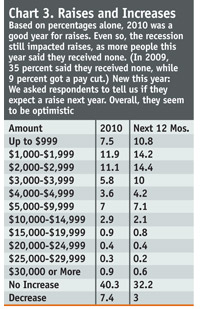
[Click on image for larger view.] |
Bonuses
While raises were better than last year's, bonuses (see Chart 4) went in the opposite direction. More than 54 percent of respondents claimed no bonus this year, which is worse than the year-ago period by 2 points. More than half of all respondents say that bonuses were based on company profitability, or a mix of profitability and personal performance. So, with the recession impacting company profitability, it follows that fewer companies would offer bonuses.
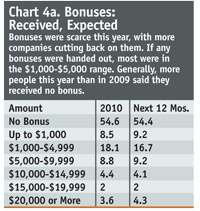
[Click on image for larger view.] |
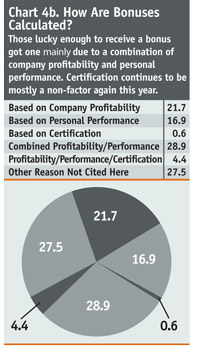
[Click on image for larger view.] |
Of those who did receive bonuses, most were in the $1,000 to $5,000 range. Tim Davis, a network admin with an insurance company in New Jersey, was among only a handful of follow-up respondents who says his company froze salaries, but "I still did get my bonus."
Respondents expect bonuses in the next 12 months to be more of the same.
It's Good to Be a Programmer
When we drill into the compensation figures a bit more closely, we get a different picture. Salaries by job title (see Chart 5) show help desk support and database programmers making the biggest gains, about 10 percent each, from last year's results. Those claiming the programmer/analyst title made 8.4 percent more than last year. Trainers saw the worst of it, with nearly a 14 percent drop from 2009.
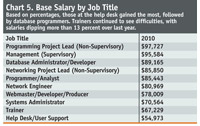
[Click on image for larger view.] |
When we compare actual take-home pay in dollars, programming project leads, who make up only 5.8 percent of all surveyed, once again top the list at $97,727. The difference this time out is that this year's result doesn't exceed 2009's six-figure result. The biggest segment of respondents was IT managers, at 36.8 percent. Like last year, they take up the second spot at $95,584, followed by DBAs and database developers, who average $89,165 (an improvement of nearly $9,000 from last year).
Add tenure to the salary versus job title mix and you get yet another perspective (see Chart 6), one that shows exactly what you'd expect: The more years served, the more you're compensated. There is an exception to the rule, of course, and that's with the webmaster/developer/producer with 10 or more years, making nearly $5,000 less than those with 6-9 years.
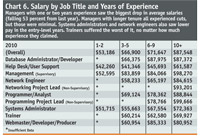
[Click on image for larger view.] |
Skills that Pay
Chart 7 shows salaries by technology expertise. Our findings this year show that, based on the percentages, gains balanced out losses to produce similar salaries to last year's in this area. Those with database development skills averaged a 6 percent higher salary ($92,460) than the year-ago period, followed by hardware design at 4.6 percent ($90,668). Oracle experts topped last year's list; this time out, they're lower by 5.9 percent ($94,555). Right behind them are those with Novell expertise, who are losing 4.9 percent ($79,096).
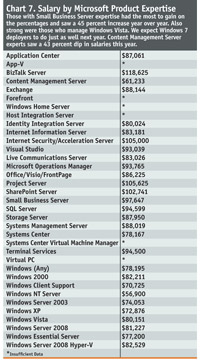
[Click on image for larger view.] |
Dollar-wise, extranet experts averaged $100,566, the only category to remain above six figures. Just slightly below are experts with outsourcing skills, at $99,740. (Those two categories were No. 2 and No. 3 last year.) Rounding out the third spot are those with e-commerce skills, at $95,323.
Hot Properties
Every year we ask respondents what Microsoft technologies they can claim expertise in (we're Redmond magazine, after all). BizTalk Server experts take top honors here, making $118,625, or 16 percent better than in 2009. Those with Internet and Acceleration Server, Project Server and SharePoint Server skills all claim six-figure salaries as well. What we see here is that respondents who have highly specialized skills tend to command the best salaries, even in tough times.
Salaries aren't the only way to gauge what's hot among the IT profession. Throughout the recession year, this magazine and other Redmond-related publications have revisited topics and technologies that favor cost-savings, efficiency and reining in resources.
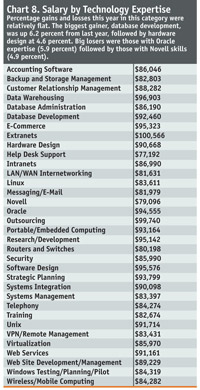
[Click on image for larger view.] |
"Virtualization is at the top of my list," says James A. "Used properly, it's such a powerful technology, but there's still so much more growth for it."
Zelinka and O'Reilly also plan to explore the merits of virtualization in the next year, even though experts who claim that skill saw their salaries go up only 2.4 percent in 2010.
Stan A., a systems administrator in Missouri, is already there: "I planned and implemented a project migrating physical servers to a VMware vSphere environment, reducing hardware, licensing and utility costs for my client," he explains.
Microsoft isn't the 800-pound-gorilla presence in mobile computing. Even so, respondents are looking at the integration of netbooks, iPads, smartphones and other devices with more interest in the coming year. "What's happening in the mobile market is fascinating," says O'Reilly.
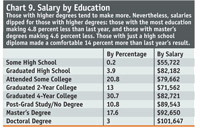
[Click on image for larger view.] |
James A. agrees: "Netbooks and smartphones are everywhere, and I think we're about to see some really impressive things finally come in the form tablet computing."
Schonwalder singles out the Google Droid platform as having the cool factor, "yet it still has some distance to go to catch up," he notes.
Hired Help
The survey that we send out is a meaty one that takes some time to fill out, with more than 80 questions. Besides salary-related questions, we ask respondents for their opinions on many career issues. This year, we added a few questions related to budget, and we'll share the data we collected in the coming months in Redmond magazine and elsewhere.
This year's survey, as in years past, had a set of questions centered around hiring and hiring prospects. Because we're in a recession, with job availability being a problem not just in IT but in the general workforce, the data we obtained takes on a bit more meaning.
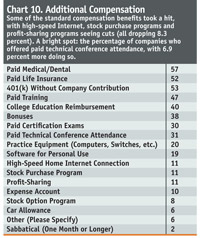
[Click on image for larger view.] |
This year's results are a mixed bag: Nearly 32 percent of respondents believe their company will hire additional IT personnel, with 46.5 percent expecting to remain in "hiring freeze" mode. Of the 32 percent who do plan to hire, half of all respondents say their companies may hire at least one person, with 10 percent hiring six to 10 people. Of our respondents, 41 percent say they have direct involvement with hiring.
On the flip side, only 4.3 percent of respondents say they were laid off in the last 12 months, with 36 percent finding work in less than a month. Of our respondents, 37 percent say they missed the axe, with 45.9 percent of those cases seeing one to five people let go, and 23 percent laying off up to 10 workers.
[Later this year, MCPmag.com will look at hiring trends in the Redmond IT community. If you're a manager or someone whose responsibilities include decision-making in the hiring process, we want to hear from you. Write to [email protected] to participate. -- Ed.]
Reeling in the Years
One thing we know about Redmond readers: They derive a lot of satisfaction in their pursuit to solve the IT challenges at their companies. Why else would they stay at this job so long? Nearly half of all respondents claim to have been in IT 15 or more years, with 29 percent telling us they've been in IT for 10 to 14 years.
What's interesting in the data we got this year is the number of hours survey takers say they worked. More than 72 percent say they worked more than the typical 40-hour week, with 28 percent putting in an extra one to five hours, and 23 percent going the distance at an extra 10 hours a week. Of our respondents, 20 percent put in 51 or more hours, making for some well-worn IT workers.
Despite the combination of long years and long hours toiling in the IT profession, quite a few respondents don't see a career outside of this one. In fact, our survey results show that 87 percent expect to be in IT in the next five years.
"I expect my career to be in IT for life," explains Kevin F., who's been in IT for 16 years -- he started right out of high school.
But O'Reilly, who's been in IT for 15 years, is starting to question his longevity. "I want to believe I'll be working in IT in some capacity or another, but I'm starting to suffer burnout just trying to keep up with everything," he says.